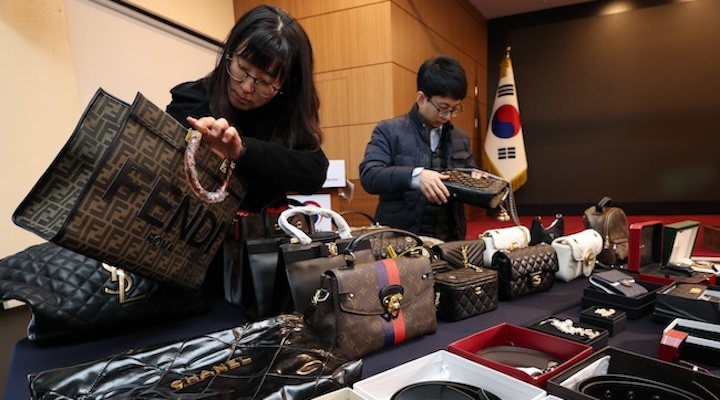Over the past five years, South Korean customs authorities have seized imported counterfeit goods worth over US$1.5 billion, with products originating from China accounting for a staggering $1.3 billion, highlighting an influx of intellectual property violations.
According to data from the Korea Customs Service released on Friday, the total value of imported goods found to be infringing on trademarks, patents or other intellectual property rights between 2018 and 2023 stood at 2.09 trillion won based on their estimated retail prices.
The illicit trade in counterfeit goods, which involves falsely representing brand names or logos, amounted to over $1.3 billion during this period.
An overwhelming 84.5 per cent of the seized counterfeit imports, valued at $1.3 billion, originated from China. Many of these intellectual property-infringing products were intercepted as they attempted to enter South Korea from the neighbouring country.
Japan ranked second at $21.1 million, followed by Hong Kong at $10.1 million.
Categorized by brand, Louis Vuitton saw $183.6 million worth of counterfeits, the largest amount across all labels. The fake goods included $159.1 million of Rolex products and $84.5 million of Chanel merchandise.
In terms of product categories, handbags topped the list at $568.7 million in seized counterfeits, followed by watches at 578.4 billion won and clothing and textiles at $151 million — illustrating the prevalence of fashion-related intellectual property violations.
The first two months of 2024 have already witnessed a spike, with $486.2 million in counterfeit imports seized, marking a 39 percent jump from the same period last year. Chinese-made counterfeits accounted for $441 million, surging 29 per cent year-over-year.
Experts have raised concerns about a lack of resources to effectively combat the influx of counterfeit goods, particularly as direct online purchases from China through platforms like AliExpress and Temu have been on the rise, exacerbating staffing shortages.
At the Pyeongtaek Customs Office, where all incoming shipments originate from China, a single customs officer oversees an average of around 3,800 parcels per day. In 2023, the office processed nearly 40 million e-commerce shipments, accounting for 45 per cent of all direct purchases from China.
This year, the Korea Customs Service has already processed 25.6 million customs claims, a 56 per cent increase from the same period last year, with purchases from China accounting for 69.6 per cent of the total.
This story was originally published by Ashley Song, via Korea Bizwire.






